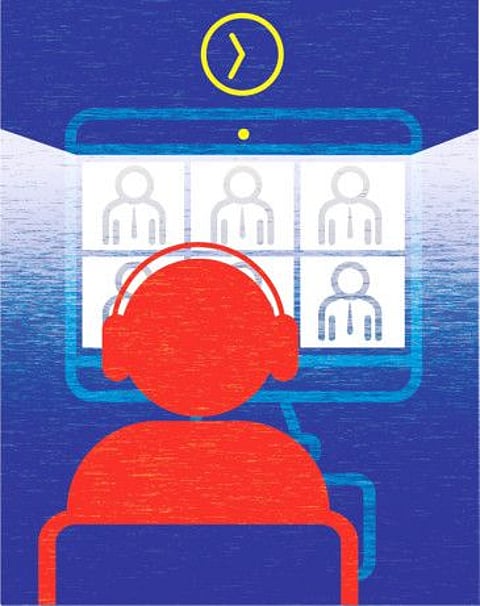Getting the hang of virtual meetings is not easy
Meeting all the on-the-job commitments during Ramadan was particularly onerous

Note to self when working from home — your front camera is not your personal hairdressing mirror.
My remote working schedule reached an all-time epic moment when I had to attend two meetings at the same time. I never had to deal with this before, not even with my “No meetings before 12pm” rule.
In a worst-case scenario, I would attend a meeting for some time before apologising and heading to the next — both hosts being aware.
There was no bailing out on either meeting this time. I considered logging into one from the laptop with the camera on, and into the other from my phone with the camera off. However, and since each meeting was hosted on a separate virtual meeting platform, I logged into both meetings from the same laptop.
This was based on my assumption that I do not need to speak in one of the meetings, and that it is up to me to speak in the other.
Not a silent spectator this time
Despite the difficulty in listening to two individuals speaking in two different meetings, i.e. different contexts, it went okay until I was asked to speak in one of them. Actually, I was asked if I had anything to add, when I gladly did my usual two thumbs up sign to signal to everyone that all is good from my end. The host insisted this time, though, and I had to speak.
I basically had my camera on in both meetings and my microphone enabled in one only, which meant that the other meeting’s attendees are left guessing what I am, supposedly, trying to say. Now, even if they did, it would have made no sense in that setting. I managed, somewhat.
Not the way it should be
Thinking about it now, there seems to be this tendency to attend more meetings, and to reply to that 11pm or weekend email, while remote working. We are all trying to demonstrate that we are actually working when staying at home, even if this is not really how we can showcase our productivity or prove attendance.
One of my favourite stories, for instance, is that of a manager who has asked all employees to send a good morning message in WhatsApp at start of working day, every day. He clearly failed to account for going back to sleep afterwards.
Ramadan modalities
As remote working extended into Ramadan, things did not change much. Compared to pre-Ramadan, remote working just seemed to shift to later hours during the day. Most recently, a colleague was complaining about individuals not answering his calls in the morning. Two weeks into Ramadan, he realised that he can get the most of his day if he synchronised his timings with those of night owls, managing to get answers to his queries sometime around midday, or later on in the afternoon.
Otherwise, a call after Iftar, post a cup of coffee, can always do the trick.
Another Ramadan-related observation, while remote working, is that sudden surge in camera-related technical issues. At first, I did not realise that it has become a recurring theme, especially since it was not the case pre-Ramadan. But since the camera’s technical issue did not, miraculously, extend to the microphone, it became clearer as days passed that there is an undeniable correlation between the camera-related technical issue, and certain timings during a working day during Ramadan.
Speaking etiquette
A final observation, and a personal struggle, is not knowing when to speak in a virtual meeting. I have seen hands being raised, when not too busy trying to break keyboards with unmuted microphones, to be given a chance to speak. Others would just suddenly start blabbering whatever they want to say, even as someone else is still speaking.
Here, the virtual “raise hand” option can be face-saving. What would further improve the virtual meeting experience, however, is enabling and automating a log of when participants have asked to speak. This way, it will be easier for the host to enable microphones in speaking order.
And while I do not intend to attend two meetings at once again, I do hope that volume can be lowered in one meeting without having to lower it in the other, just in case. Finally, it should be part of virtual meetings’ etiquette to let participants know if they are attending a camera-on or camera-off kind of meeting, especially during Ramadan.
The last thought that I want to leave you with: Did someone make it mandatory to have a “shelves of books” background during virtual meetings?
- Abdulnasser Alshaali is a UAE-based economist.







